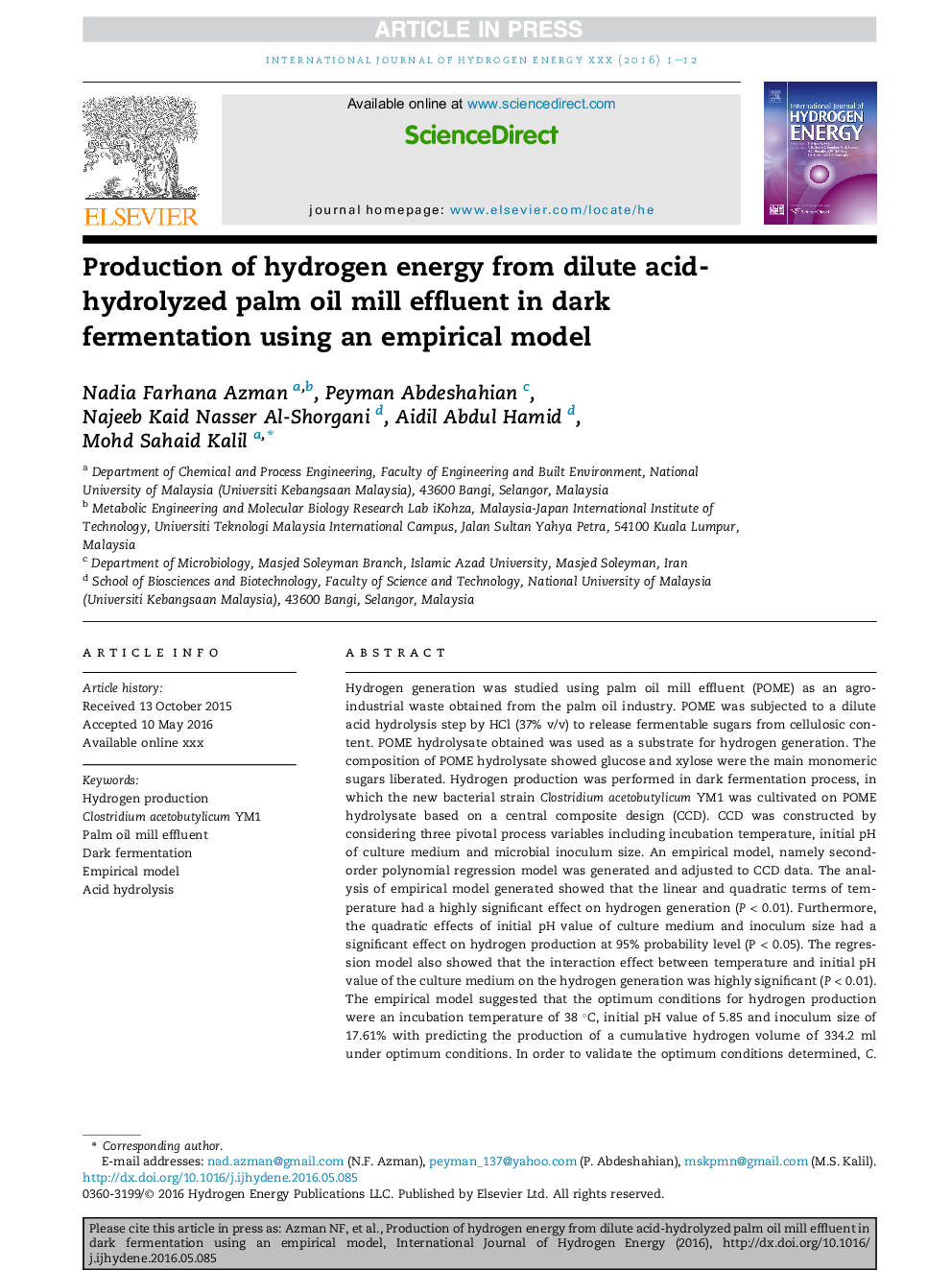| کد مقاله | کد نشریه | سال انتشار | مقاله انگلیسی | نسخه تمام متن |
|---|---|---|---|---|
| 5147646 | 1497388 | 2016 | 12 صفحه PDF | دانلود رایگان |
عنوان انگلیسی مقاله ISI
Production of hydrogen energy from dilute acid-hydrolyzed palm oil mill effluent in dark fermentation using an empirical model
ترجمه فارسی عنوان
تولید انرژی هیدروژنی از رقیق سازی اسید هیدرولیز شده از روغن نخل روغن نخل در تخمیر تیره با استفاده از یک مدل تجربی
دانلود مقاله + سفارش ترجمه
دانلود مقاله ISI انگلیسی
رایگان برای ایرانیان
کلمات کلیدی
موضوعات مرتبط
مهندسی و علوم پایه
شیمی
الکتروشیمی
چکیده انگلیسی
Hydrogen generation was studied using palm oil mill effluent (POME) as an agro-industrial waste obtained from the palm oil industry. POME was subjected to a dilute acid hydrolysis step by HCl (37% v/v) to release fermentable sugars from cellulosic content. POME hydrolysate obtained was used as a substrate for hydrogen generation. The composition of POME hydrolysate showed glucose and xylose were the main monomeric sugars liberated. Hydrogen production was performed in dark fermentation process, in which the new bacterial strain Clostridium acetobutylicum YM1 was cultivated on POME hydrolysate based on a central composite design (CCD). CCD was constructed by considering three pivotal process variables including incubation temperature, initial pH of culture medium and microbial inoculum size. An empirical model, namely second-order polynomial regression model was generated and adjusted to CCD data. The analysis of empirical model generated showed that the linear and quadratic terms of temperature had a highly significant effect on hydrogen generation (P < 0.01). Furthermore, the quadratic effects of initial pH value of culture medium and inoculum size had a significant effect on hydrogen production at 95% probability level (P < 0.05). The regression model also showed that the interaction effect between temperature and initial pH value of the culture medium on the hydrogen generation was highly significant (P < 0.01). The empirical model suggested that the optimum conditions for hydrogen production were an incubation temperature of 38 °C, initial pH value of 5.85 and inoculum size of 17.61% with predicting the production of a cumulative hydrogen volume of 334.2 ml under optimum conditions. In order to validate the optimum conditions determined, C. acetobutylicum YM1 was cultivated on POME hydrolysate in optimum conditions. Verification test results showed that a cumulative hydrogen volume of 333.5 ml and a hydrogen yield of 108.35 ml H2/g total reducing sugars consumed were produced.
ناشر
Database: Elsevier - ScienceDirect (ساینس دایرکت)
Journal: International Journal of Hydrogen Energy - Volume 41, Issue 37, 5 October 2016, Pages 16373-16384
Journal: International Journal of Hydrogen Energy - Volume 41, Issue 37, 5 October 2016, Pages 16373-16384
نویسندگان
Nadia Farhana Azman, Peyman Abdeshahian, Najeeb Kaid Nasser Al-Shorgani, Aidil Abdul Hamid, Mohd Sahaid Kalil,
